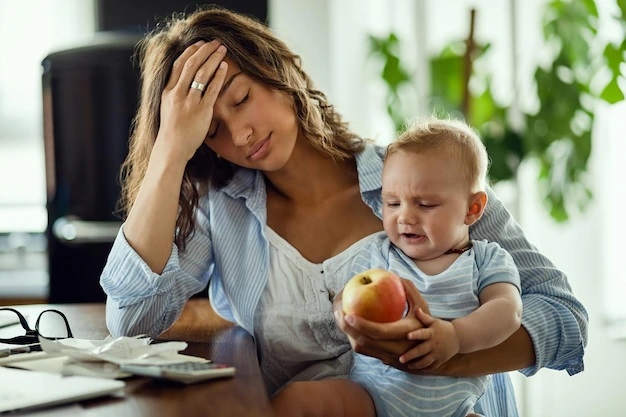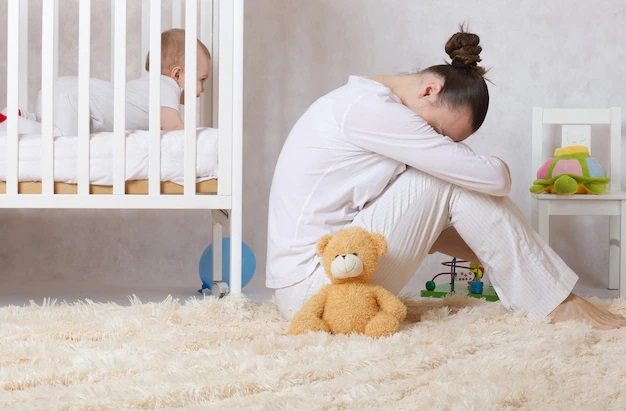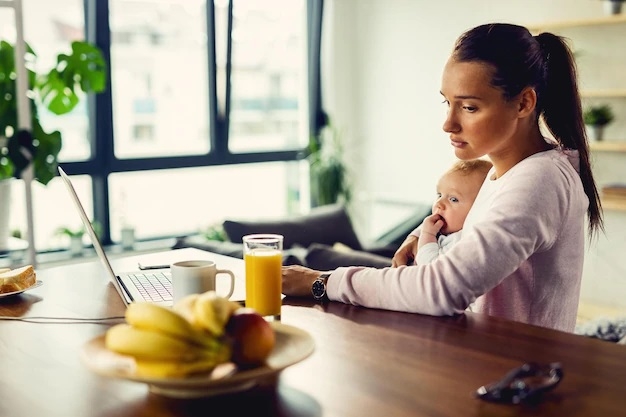Dealing with Postnatal Depression - The Telltale Signs!
July 13th, 2022
1340 Views

Feeling depressed after the birth of your baby is a common problem that is experienced by many new parents. As many as one in ten new mothers are affected and fathers/partners can be affected too. During the Covid lockdown, this figure rose to one third of all new mothers. It is important to get help early on if your feelings of depression continue, as the symptoms can last months and can also get worse.
It is very natural to feel down and tearful in the first week following the birth of your baby and these feelings were given the name ‘baby blues’ many years ago. An indicator that something is wrong is when the blue feelings last longer than a fortnight or begin weeks or months later and last longer as this could be a sign of postnatal depression and it is a good idea to chat to your GP about how you are feeling.
Postnatal depression (also known as Postpartum depression- PPD) can begin at any time during the first year of your baby’s life as you adjust to your new – and very demanding- role. Many women do not realise that they have postnatal depression because it often develops slowly, so it is well worth learning the signs in case you feel that one of your friends or relatives is beginning to struggle.
It is very natural to feel down and tearful in the first week following the birth of your baby and these feelings were given the name ‘baby blues’ many years ago. An indicator that something is wrong is when the blue feelings last longer than a fortnight or begin weeks or months later and last longer as this could be a sign of postnatal depression and it is a good idea to chat to your GP about how you are feeling.
Postnatal depression (also known as Postpartum depression- PPD) can begin at any time during the first year of your baby’s life as you adjust to your new – and very demanding- role. Many women do not realise that they have postnatal depression because it often develops slowly, so it is well worth learning the signs in case you feel that one of your friends or relatives is beginning to struggle.

Signs that you could have postnatal depression....
• Feeling low continually or feeling sad.
• Not being able to enjoy the things you used to love and not having any interest in the outside world.
• Feeling continually tired with no energy
• Having difficulty sleeping at night and feeling sleepy during the daytime
• Having problems difficulty bonding with your baby
• Not wanting to make contact with friends
• Having difficulty concentrating and/or making decisions
• Experiencing frightening thoughts – perhaps even about harming your baby
‘The risk for postpartum depression is highest among first-time mothers, mothers younger than 25 years old and mothers of twins, according to a survey of more than 1.1 million mothers worldwide.
Mothers older than 40 years old having twins are at the highest risk, researchers from the University of Virginia School of Medicine, Johns Hopkins University and Flo Health found.
"The size of this study, in over 1 million new mothers, make the findings highly significant and definitive," said Dr. Jennifer L. Payne, the study’s senior author and director of the Reproductive Psychiatry Research Program at the UVA School of Medicine. "Most studies on postpartum depression are small and confined to a small region. This study answers questions about risk factors for postpartum depression from a worldwide sample."
• Feeling low continually or feeling sad.
• Not being able to enjoy the things you used to love and not having any interest in the outside world.
• Feeling continually tired with no energy
• Having difficulty sleeping at night and feeling sleepy during the daytime
• Having problems difficulty bonding with your baby
• Not wanting to make contact with friends
• Having difficulty concentrating and/or making decisions
• Experiencing frightening thoughts – perhaps even about harming your baby
The findings of a recent study-
Postnatal depression can affect anyone and often affects new mums who have wanted their babies so much. Some scientists believe that it can be linked to certain factors and these are the results found in a recent study that was reported in UVA Today(University of Virginia) in February 2022-‘The risk for postpartum depression is highest among first-time mothers, mothers younger than 25 years old and mothers of twins, according to a survey of more than 1.1 million mothers worldwide.
Mothers older than 40 years old having twins are at the highest risk, researchers from the University of Virginia School of Medicine, Johns Hopkins University and Flo Health found.
"The size of this study, in over 1 million new mothers, make the findings highly significant and definitive," said Dr. Jennifer L. Payne, the study’s senior author and director of the Reproductive Psychiatry Research Program at the UVA School of Medicine. "Most studies on postpartum depression are small and confined to a small region. This study answers questions about risk factors for postpartum depression from a worldwide sample."

Important points to remember
Depression is an illness like any other so there is no shame in admitting to your doctor that you are not feeling good and it is certainly not your fault in any way that you don’t feel happy and bouncy like the mums portrayed on the TV ads. It is in no way a sign that you are a bad parent and your baby will certainly not be taken away from you as this is only done in really exceptional circumstances.Feeling depressed is distressing and frightening and can make you feel so alone, so if you can contact your GP they can help you get the support you need and get the right treatment.
Postnatal depression can be treated
Your doctor may recommend that you have a course of cognitive behavioural therapy (CBT) which can be very effective ore prescribe you with a course of special antidepressants that you can take – even if you are breastfeeding.
There are things that you can do too...
If you have good friends, it can make a real difference if you can share with them how you are feeling. It is important to have time each day to do the things that you enjoyed doing pre-baby so ask your partner, mum or friend if they could babysit for an hour each day – even having a lazy bath with bubbles, music and candles can be really uplifting and going to the beautician or hairdresser to be pampered is great! Even going for a walk in a park or wood to enjoy trees and flowers can help you to feel better.Don’t try and do too much. When your baby takes a nap, why don’t you do so too or spend the time reading a book or telephoning someone. Try and eat a really healthy diet and this includes plenty of salads that are quick and easy to prepare.
Try and get out for a walk with your baby every day as it can make you feel good just to say ‘hello’ to someone while you are out. You can walk to the park or into town to buy the things for dinner or walk down the road and say ‘hello’ to your neighbours. Join a mother and baby club or baby swimming session as it is a good way to meet other mums- after all, they could be feeling just the same as you….
Useful reading:
● /www.mind.org.uk/information-support/types-of-mental-health-problems/postnatal-depression-and-perinatal-mental-health/support-and-services/
● www.pandasfoundation.org.uk/
● www.apni.org/
Chrissie x

